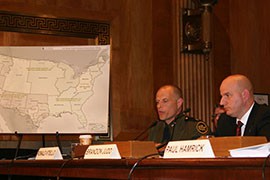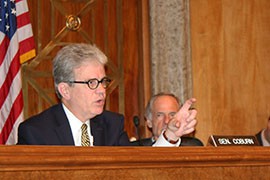Cronkite News has moved to a new home at cronkitenews.azpbs.org. Use this site to search archives from 2011 to May 2015. You can search the new site for current stories.
Senate panel weighs plan to rein in Border Patrol agents’ overtime
WASHINGTON – A Senate committee was urged Monday to fix the “hopelessly broken” overtime policy for border patrol agents, by boosting agents’ base pay but cutting any extra pay they would otherwise get for overtime hours.
The Border Patrol Agent Pay Reform Act of 2013 has the support of Customs and Border Patrol officials as well as the organization that represents more than 16,000 border patrol agents. They say the changes will ultimately increase border security by creating pay stability for agents and improving retention, without cutting hours needed to do the job.
“Without relief legislatively, effectiveness will suffer and morale is very likely to take a downward turn,” said U.S. Border Patrol Deputy Chief Ronald Vitiello.
The bill, introduced by Sens. John McCain, R-Ariz., and Jon Tester, D-Mont., would allow agents to boost their base pay rate by as much as 25 percent. In exchange, overtime would be paid at straight-time rates, so that compensation for the first hour of the shift and compensation for the 10th hour would be the same.
Brandon Judd, president of the National Border Patrol Council that represents agents, told the committee the change would end up costing the average agent $6,200 per year. But it would also give agents stability in their pay and allow them to work the extra hours they say are needed to do the job on the borders.
Uncertainty about hours is currently driving agents away, he said.
Judd pointed to the Brian A. Terry Border Patrol Station in Naco, historically one of the busiest in the country. It has seen 5 percent of its workers leave in the last year due to cuts in pay and hours, he said, and another 15 percent of agents at Naco have applied for jobs in other agencies.
“We can’t afford to lose 20 percent of a station, especially a station so important to the Tucson sector, but that’s what’s happening,” Judd said.
The pay reform bill is also aimed at cutting back the abuse of overtime paid for “irregular, unscheduled” hours known as administratively uncontrollable overtime, or AUO.
Border patrol agents are scheduled to work eight-hour days, but it has become increasingly common for them to work 10-hour days, meaning agents often work two hours of AUO a day.
“Decades ago, when AUO was first developed, the idea was that the border was very big and there weren’t a whole lot of agents,” said Adam Miles, of the U.S. Office of Special Counsel. “Now the situation has changed.”
With more agents in the field, and advancements in technology, Miles said, border patrol work is much more routine and predictable.
“Basically the way the AUO is being used is the exact opposite of how it was intended: It’s routine and it’s daily, in contrast to the rules that require the irregular and unpredictable,” Miles said to the Senate Committee on Homeland Security and Governmental Affairs.
Sen. Tom Coburn, R-Okla., said border patrol agents should be paid adequately for the risk and effort that they put in. But he questioned the need for changing base pay rates when better management of workers’ hours – particularly administrative workers – might do the job.
Tester responded by saying that changes in the operational needs at the border over the last 40 years are precisely why reform is needed.
At the end of the hearing, Tester pressed Sen. Tom Carper, D-Del., the committee chairman, for a quick markup so the bill could get to the Senate floor as soon as possible. Carper would not commit to a timeframe.
If they don’t act, Tester said, the borders will be less secure and the blame will lie with the committee, not the border agencies.
“We’ve waited long enough,” Tester said. “We need to move forward with this bill because it ensures stability for our border patrol agents and makes sure that our borders are properly manned.”








